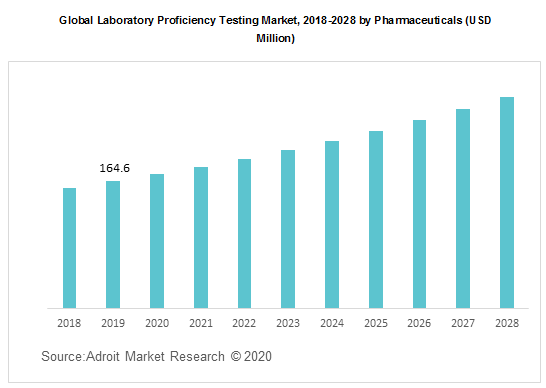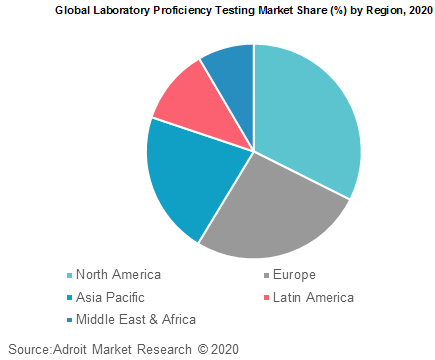The global market for laboratory proficiency testing was valued at USD 1102.9 million in 2022 and is projected to grow at a compound annual growth rate (CAGR) of 5.94% to reach USD 1559.3 million in 2028.
.jpg)
Owing to technical developments in the research sector, the laboratory filtration knowledge market is expected to see commendable growth in the coming years. Several businesses including Bio-Rad Laboratories are continually developing developments in the research programmes.
Recent initiatives are successful and help the laboratories improve their efficiency in corporate compliance training with criteria set by international organisations. Currently available competence pyrogen testing assess and evaluate the performance of different laboratories and provide comparative standards for each test that lets laboratories enhance and sustain the level of services that it delivers favourably affecting the development of the industry.
Key players serving the global market include Fera Science, Randox , LGC, Merck , BioControl Systems Inc., College of American Pathologists, among other prominent players.
laboratory proficiency testing market Scope
| Metrics | Details |
| Base Year | 2023 |
| Historic Data | 2018-2022 |
| Forecast Period | 2024-2028 |
| Study Period | 2018-2028 |
| Forecast Unit | Value (USD) |
| Revenue forecast in 2028 | USD 1559.3 million |
| Growth Rate | CAGR of 5.94 % during 2018-2028 |
| Segment Covered | Industry , Regions. |
| Regions Covered | North America, Europe, Asia Pacific, South America, Middle East and Africa |
| Key Players Profiled | Fera Science, Randox , LGC, Merck , BioControl Systems Inc., College of American Pathologists, among other |
Key segments of the global laboratory proficiency testing market
Industry Overview
- Pharmaceuticals
- Biologics
- Clinical Diagnostics
- Microbiology
- Cosmetics
- Cannabis
- Food and Animal Feed
- Commercial Beverages
- Water
- Environmental
- Dietary Supplements
- Nutraceuticals
Regional Overview
- North America
- U.S.
- Canada
- Europe
- Germany
- United Kingdom
- France
- Spain
- Rest of Europe
- Asia Pacific
- China
- Japan
- India
- Rest of Asia Pacific
- Latin America
- Middle East & Africa
Reasons for the study
- The purpose of the study is to give an exhaustive outlook of the global laboratory proficiency testing industry
- The overall segmentation of laboratory proficiency testing market, especially key segments are thoroughly studied.
- Presence of major players and their wide Industry portfolio across developed countries is anticipated to further boost the growth of laboratory proficiency testing market
What does the report include?
- The study on the global laboratory proficiency testing market includes analysis of qualitative market indicators such as drivers, restraints, challenges and opportunities
- Additionally, the market competition has been evaluated using the Porter’s five forces analysis
- The study covers qualitative and quantitative analysis of the market segmented on the basis of class and Industry. Moreover, the study provides similar information for the key geographies.
- Actual market sizes and forecasts have been provided for all the considered segments
- The study includes the profiles of key players in the market with a significant global and/or regional presence
Who should buy this report?
- The report on the global laboratory proficiency testing market is suitable for all the players across the value chain including raw material suppliers, laboratory proficiency testing providers, medical device manufacturers, distributors, suppliers and retailers
- Venture capitalists and investors looking for more information on the future outlook of the global laboratory proficiency testing market
Consultants, analysts, researchers, and academicians looking for insights shaping the global laboratory proficiency testing market
Frequently Asked Questions (FAQ) :
Proficiency assessment measures the performance of particular laboratories for various assessments or measurements and is used for measuring the continued success of laboratories. Interlaboratory evaluation is also called competence assessment. As this term means, proficiency testing compares the results of evaluation obtained by various laboratories. One or more samples are distributed to a variety of participating laboratories in a proficiency test. Laboratory tests the artefacts according to a specified set of instructions (e.g. a ring gauge or a collection of gauge blocks) and reports the findings to the supervisor.
The safety regulations for the pharmaceutical and food industries would fuel fast-growing industry growth. In order to prevent accidents, pharmaceutical firms and businesses processing foodstuffs have to comply with laws imposed by authorities. Individuals specifically ingest goods sold by the pharmacy and food sectors. Some complications or deficiencies in these items can have lethal effects on humans. Therefore, these companies' labs and R&D divisions are closely checked for productivity and consistency. Factors listed above fuel growth in the sector.
The global laboratory proficiency testing market has been bifurcated based on Industry and region. In terms of industry the market is divided into pharmaceuticals, biologics, clinical diagnostics, microbiology, cosmetics, cannabis, food and animal feed, commercial beverages, water, environmental, dietary supplements, nutraceuticals.
During the forecast era, the pharmaceutical segment is projected to rise at the notable CAGR in the pharmaceutical competence testing market by sector. Strict regulatory regulations on medication safety and effectiveness, time-consuming clinical testing procedures, and prolonged drug production cycles for new generic medications are some of the main reasons that have raised emphasis on marketed drug proficiency exams.

Based on regions, the global laboratory proficiency testing market is segmented into North America, Europe, Asia Pacific, Central and South America and Middle East & Africa. Emerging markets such as APAC are giving companies major growth prospects in the demand for the Industry’s in coming years.
North America holds the largest share of market sales due to expanded awareness of the availability of high-quality laboratory knowledge research services and a favourable regulatory scenario that enhances regional demand growth. Additionally, developing economies such as the U.S. and Canada have trained practitioners to administer laboratory training programmes that are projected to fuel regional demand growth


